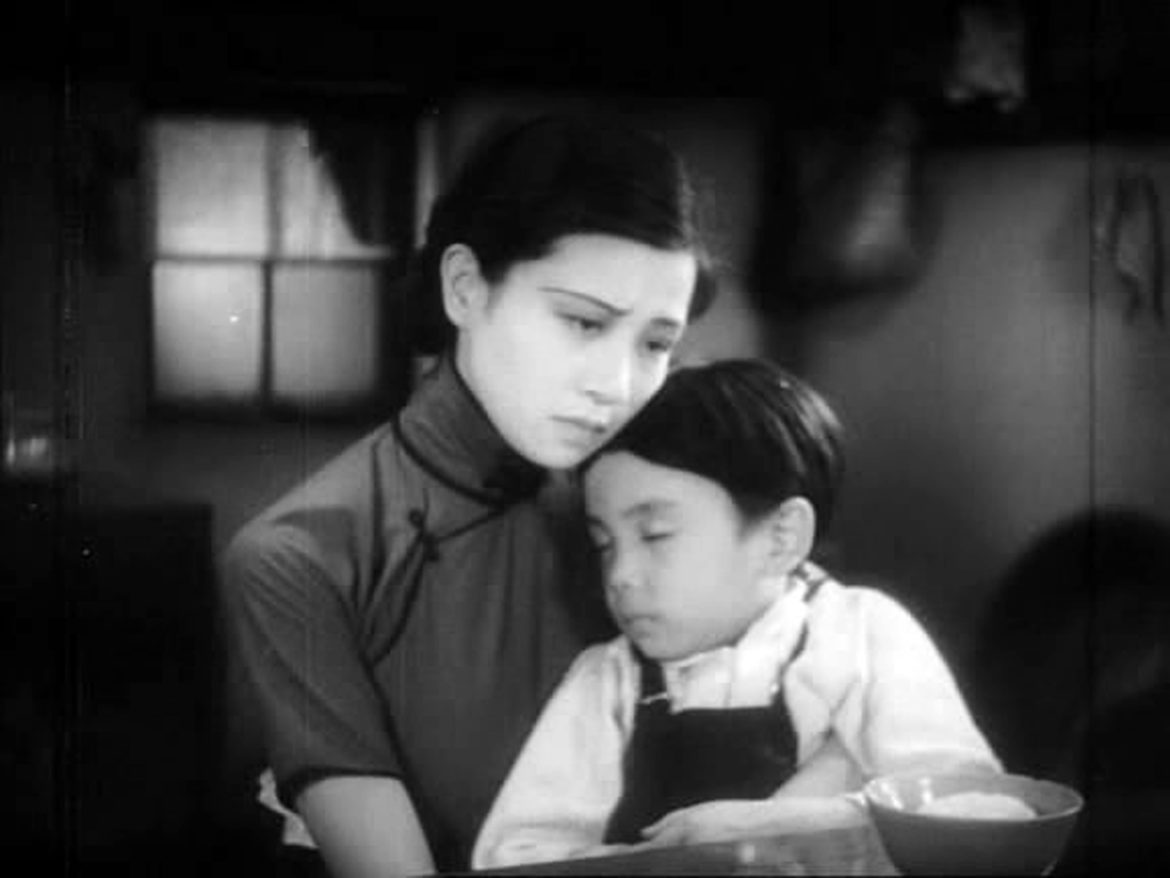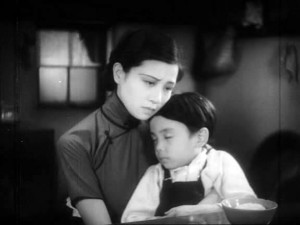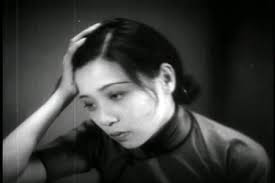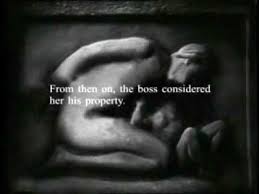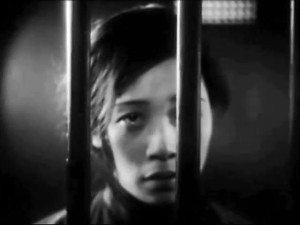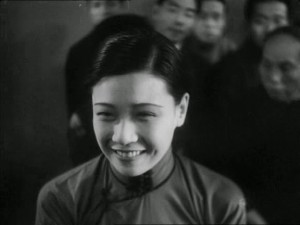Part of an ongoing effort to watch a set of films from non-White, non-U.S., non-male, and/or non-straight filmmakers and depart a little from the Western canon. The intro and full list can be found here.
Here is a film I knew nothing about two days ago, but would now rank among the greatest of the silent era. The story of an unwed mother on the margins of Chinese society, doing everything in her power to help her son succeed, The Goddess displays an enormous depth of emotion, nuance, and social critique.
These are conveyed by expressive cinematography and naturalistic pacing, but more than anything by the power of Ruan’s portrayal. Referred to as “the Greta Garbo of Shanghai”, Ruan pours her soul on the screen here, seemingly drawing from a deep connection to the role. Her presence is palpable all these years later, her face flickering with conflicting emotions and a tumultuous inner life that, unfortunately, proved all too real. The Goddess was released in 1934. Ruan would be dead a year later by her own hand. Reportedly, more than 100,000 people joined her funeral procession. She was 24.
The thrust of the narrative in The Goddess is a familiar one, not too different from a number of pictures at the time, including those of G.W. Pabst and Josef von Sternberg. A patriarchal society limits a woman’s options to get by in the world, so she opts to work as a prostitute to make ends meet and provide for her loved ones (in this case, her beloved son, who she is determined to ensure succeeds as she never could). Of course, in its hypocrisy, that same society castigates her for this, further marginalizing her for the crime of trying to survive.
One key difference between The Goddess and many of those “fallen women” stories: the total absence of judgment or pure sentimentality. Ruan’s unnamed protagonist is an active agent in her life, pushing back against these social forces that would constrain her life, and far less concerned with her virtue (or supposed lack thereof) than simply creating a future for her (also unnamed) boy. This in and of itself is striking. The Goddess is not moralistic on the individual level, though the left-wing politics of its director are never far from mind as far as the wider structures are concerned. Ruan is a victim of injustice here – the greed of the gangster who insinuates himself as her pimp, the nasty gossip of the local women who consider themselves above her – but also a fierce advocate for her own interests, doing her best to navigate impossible circumstances. It’s hugely sympathetic and affecting.
Aesthetically, The Goddess feels surprisingly modern. Ruan’s performance certainly carries with it a kind of Method authenticity and naturalism, and Wu fills the screen with montage sequences of the flashing lights of the Shanghai skyline, conveying both the pulse of a modern city and its dangers and illusions. One memorable shot frames Ruan clutching her child as seen from low on the floor, visible between the legs of the evil gangster exploiting them both. It’s an image of connection, devotion, and love amid powerlessness, with the looming presence of volatile masculinity, that would seem appropriate in a film from the New Hollywood. But here it is, in a Shanghai production from 1934. Like its unapologetic championing of the downtrodden, and refusal to sentimentalize their suffering, The Goddess‘ images seem far ahead of their time.
The film ends in the final expression of long-simmering violence, a sacrificial prison sentence, and a new day dawning for the young boy. The series of expressions that illuminate Ruan’s face in its closing frames speak to her power as an actress on the screen – grief, tempered joy, resignation, satisfaction, all clearly delineated though at odds with each other, all felt by turn and then all at once. She can’t win – this is a melodrama, after all – but she has no choice but to try. And she did it all for love, and she’d do it again. Wu clearly aimed to frame her suffering in political allegory, as a critique against the lingering prejudices of feudalism, but what sticks most upon watching The Goddess is the character Ruan embodied so effortlessly. It’s a performance for the ages.
But that effortlessness proves haunting. Ruan was also the child of a widowed mother, who worked as a maid in a rich family’s house, yet was able to send her daughter to a private school for well-to-do children. Just as in The Goddess, an invitation to come hear her child sing in a school performance led to social ostracism – in the film, because the locals gossip about what she does for a living; in Ruan’s childhood, because it ultimately led her to cross paths with Zhang Damin, the child of her mother’s employer, beginning a lifelong and disastrous relationship. In New Women, filmed around the same time and released the following year, Ruan’s character overdoses intentionally on sleeping pills, just as Ruan herself had tried to do, unsucessfully, a few years prior, and just as she would do again in a few months.
How much of these echoes in cinema of her real-life struggles found their way into her performances? These are always dicey propositions, associating art with personal struggles, but it seems hard to ignore here. The complexity of Ruan’s performance in The Goddess indicates an actress drawing deeply from experience, and its power is undeniable. The film was heralded immediately, but the press was also full of stories of her strife with Damin and her other love relationships. Juicy stuff sells, then as now.
It would all be over within the year. Hounded by the Shanghai tabloids, who were eager to print columns either about her “salacious” roles or more private scandal, and trapped in an abusive relationship, Ruan mixed three bottles of sleeping pills into a bowl of congee and ate it. Her final note to the world read: “Gossip is a fearful thing.”
To complete the tragedy, her lover, discovering her suicide attempt, bypassed several local hospitals to take her to one further out of town. He hoped to avoid attention, for her but, it seems, also for him. She died on International Women’s Day, several hours before she was scheduled to speak to a girl’s school for the occasion. While “the Greta Garbo of Shanghai” might’ve stuck, Ruan shares more than a little with another icon – Marilyn Monroe. Indeed, even her death couldn’t stop the lurid tales, and might’ve fed them even more, while still others seized on her as an emblem for any number of political critiques. In death as in life, she was pilloried and exalted, apparently the only two options we have for complicated women in culture.*
It would be absurd to claim that every bit of this comes through in The Goddess. But I knew none of it coming into the film and can attest that some of it surely does. Ruan Ling-yu was clearly a remarkable actress, and this film finds her at the height of her powers, and battling tremendous demons. This is something silent films know, and can reveal, in ways that later cinema often can’t – Ruan lights up the screen with her vitality and her pain, conveyed in gestures and eyes, with no need to get bogged down in exposition.
“The Goddess” – shennü – is a term used coyly here: it can refer either to a selfless protector or, as in old slang, a prostitute. The corrosive “virgin/whore dichotomy” rarely gets made so explicitly, or critiqued so movingly. That Ruan Ling-yu understood this, and agonized over it, is evident in every frame. The world did not do right by this young master of her craft, but she lives on in cinema, defiant and proud to the end.
Next up: Our Neighbor, Miss Yae, Yasujirô Shimazu
* All taken from The Buffalo Film Seminars, 24 January 2006, XII:2 (PDF)

